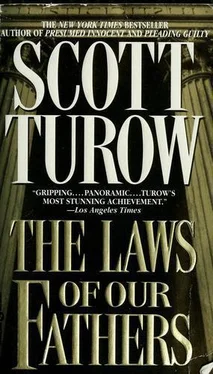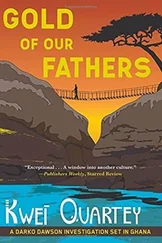Scott Turow - The Laws of our Fathers
Здесь есть возможность читать онлайн «Scott Turow - The Laws of our Fathers» весь текст электронной книги совершенно бесплатно (целиком полную версию без сокращений). В некоторых случаях можно слушать аудио, скачать через торрент в формате fb2 и присутствует краткое содержание. Жанр: Криминальный детектив, на английском языке. Описание произведения, (предисловие) а так же отзывы посетителей доступны на портале библиотеки ЛибКат.
- Название:The Laws of our Fathers
- Автор:
- Жанр:
- Год:неизвестен
- ISBN:нет данных
- Рейтинг книги:5 / 5. Голосов: 1
-
Избранное:Добавить в избранное
- Отзывы:
-
Ваша оценка:
- 100
- 1
- 2
- 3
- 4
- 5
The Laws of our Fathers: краткое содержание, описание и аннотация
Предлагаем к чтению аннотацию, описание, краткое содержание или предисловие (зависит от того, что написал сам автор книги «The Laws of our Fathers»). Если вы не нашли необходимую информацию о книге — напишите в комментариях, мы постараемся отыскать её.
The Laws of our Fathers — читать онлайн бесплатно полную книгу (весь текст) целиком
Ниже представлен текст книги, разбитый по страницам. Система сохранения места последней прочитанной страницы, позволяет с удобством читать онлайн бесплатно книгу «The Laws of our Fathers», без необходимости каждый раз заново искать на чём Вы остановились. Поставьте закладку, и сможете в любой момент перейти на страницу, на которой закончили чтение.
Интервал:
Закладка:
'Nile Eddgar,' says Lubitsch. 'He's Hardcore's probation officer.'
In the corridor outside, between the chambers and the courtrooms, somebody important enough to be disdainful of the peace happens by whistling.
'This gangbanger killed his probation officer's mother in a drive-by?' Sonny asks. 'That's a coincidence?'
'That's no coincidence. And no drive-by. Maybe the Saints want to make it look that way. This was a contract killing.'
The portent of this is bad: A street gang taking deliberate aim on a probation officer's family. A new battlefront opened in the war on the streets.
'Want to know the rest?' asks Lubitsch, still glowing.
'I'll hear it in court, Fred. I'm going to do your warrant after my motions.'
'Whatever you say, Judge,' he answers, but cannot restrain one more disbelieving toss of his head. He says yet again, 'It's a doozy.'
Sonny grabs the black robe from the coat tree behind her desk and zips it halfway. With a certain processional formality, Marietta and Annie hasten before her down the hall into the courtroom. A double doozy. Everyone will want a piece of this case. The Mayor will be on TV, sticking up for law enforcement. An atmosphere of brooding anger will penetrate the courtroom. Sonny, who has not yet endured the storm of a controversial case, becomes conscious somewhere at her center of the troubled qualms of fear.
In the corridor, Marietta's fine alto arrives, so round with pride you would think it's her own name she is singing out. 'The Honorable Sonia Klonsky,' she can be heard crying, 'judge presiding.'
*
Two p.m. bond call. Black men in manacles. The Chief Judge, Brendan Tuohey, sets bail according to a pre-established scale on all cases on which the grand jury returns an indictment. But under state law when a defendant is arrested on the basis of a prosecutor's complaint, he is entitled to a bond hearing before the assigned trial judge. Sonny regards it as one of her saddest duties to deliver the crushing news most of these young men receive, that their liberty, like some item checked at the door, is lost and unlikely soon to be retrieved.
April, Eliot said, is the cruelest month. But if he was looking for the cruelest place, he should have come here, to the Superior Court of Kindle County. A kind of barbarity seems to blow in with the defendants from the bad neighborhoods and mean streets, a grim devastation, a slaughterhouse reek. Here are freely traded the secrets no one wants to hear. At one point last month, there were four different trials ongoing involving mothers or fathers who had murdered their children. This morning Sonny arraigned six gang members who surrounded a recalcitrant twelve-year-old in a housing project stairwell and beat him with a pipe until the brain matter was literally oozing from his skull. These tales of astonishing brutality, of stabbings and rapes, of shootings and stickups, of the inevitable 'crime of the day,' so heinous that, like certain forms of pornography, it seems beyond normal imagining – these are routine, routine, routine, and their meanness is matched only by the system of which she is standard-bearer and emblem, whose clandestine rationale too often seems to Sonny to be to capture, judge, and warehouse the very poor. Every month or so, preparing for a status call, she will go back to the lockup, looking for Annie or the transport deputy, and confront, through the bars, the day's load of prisoners, twelve or fourteen young men. You would expect them to rise up and revolt, but most are quiet, shifting about, smoking their cigarettes. If they dare to look her way at all it is without defiance or, often, hope. They have been humiliated. Tamed.
On the bench, though, sorrow is seldom the predominant emotion. In this atmosphere of loathing and fear she labors on, trying to impose reason where, generally speaking, impulse and emotion have held sway. Murder is the marquee business of this courtroom – gangbangers killing gangbangers; men killing men. They use guns mostly – also knives, bats, razor blades, automobiles, crowbars, and, in one celebrated case, an anvil. The young people kill each other for reasons that are often incomprehensible: because somebody was signifying on the wrong corner; because a jacket was torn. In nine months, she has mastered all the terminology: 'ride-by' (shooting on the move); 'drive-up' (firing from a stop); 'drive-through' (the car is the weapon); 'chase-aways' (the enemy flees). The older folks also live in a world from which anger and desperation emanate, as tangible as heat. Yes, men still kill each other over dice games, drugs, and, naturally, who was coveting whose girl. What can you say about a loaded gun in the hand of a spurned and drunken man? On the streets, unrequited love and death go together almost as often as in Shakespeare.
Now the courtroom lingers in the somnolent air of the afternoon. This morning, during the weekly status call, the courtroom and corridor teemed with all the urgent antagonists, the defense lawyers, the cops and prosecutors, the aggravated citizen witnesses, the deputies sullenly transporting the defendants, and those defendants' beleaguered, woebegone women. But now there is a melancholy stillness. Outside the open doors at the rear of the courtroom, a custodian mops the halls in the yellowing light.
Marietta hammers the gavel sharply, and the lawyers and reporters and sheriff's deputies slowly gather themselves to their feet, as Sonny climbs up the four stairs beside the bench, a clean-lined oak affair of faux-Bauhaus design. The senior judges sit in stately palaces in the main building on the third and fourth floors, vast chambers that bespeak the same architectural strategies as cathedrals – the individual dwarfed by the majesty of marble columns and gilt-framed portraiture, by the rococo gewgaws of carved walnut and ceilings vaulting two and a half stories above. These courtrooms in the Central Courthouse Annex were built in the eighties, when DC poured what money there was into law enforcement. The room strikes a clanging note of late-century efficiency – bang for the buck. For Sonny, the courtroom feels as intimate as her living room, but like certain children, its glory is not obvious to outsiders. It is a pie-shaped room, broadening back from the bench, rickety public construction, the plasterboard gouged in places, the meal-colored carpet already tearing away in hairy chunks. The jury box and witness stand repeat the stark lines of the bench. Weirdest is the track lighting, reminiscent of a motel lounge, which is positioned over the major players -judge, witness, attorneys – leaving dim spots throughout the windowless courtroom where the lawyers, the bailiff, the clerks tend to retreat in relaxed instants, like actors offstage.
In the wake of the shooting death of a matrimonial court judge several years ago, these courtrooms have been built with a wall of bulletproof glass in front of the spectators' sections. The sound of justice being done is piped back there by way of microphones which seem to pick up the heavy breath of everyone – defendants, lawyers, Sonny herself – in the intervals between words. She looks out there every day, toward the friends, the relatives edging forward on their seats to catch some sight, some news about their loved one in jail overalls. In warning to them, Marietta has taped a hand-lettered sign to their side of the glass: No eating no drinking no visiting In the Lockup Or the Courtroom
Now the dozen reporters who are present resume the leather barrel chairs in the jury box, where they have placed themselves to ensure that they can hear. The amplification system to the region beyond the glass often conks out, and the angled walls make the acoustics unpredictable. The journalists are mostly the hangdog beat reporters, but two of the pretty faces of local TV are present. Stanley Rosenberg, the little ferret from Channel 5, in a $500 blazer – and ratty blue jeans that the camera will not see – scurries to a seat next to a sketch artist he has brought along. In this courthouse, where the judges are elected, the press is inevitably accommodated, especially in the afternoon, when the reporters are all on deadline. Marietta calls first the case about the murder of June Eddgar. 'People versus Ordell Trent!' From the lockup, the defendant, a.k.a. Hardcore, is brought into the courtroom in his blue jumpsuit, handcuffs, and ankle chains. With mild alarm, Sonny recognizes the lawyer who comes to stand beside him, Jackson Aires. Aires has fought these wars so long he comes up firing out of instinct – one of those guys who talks the trash he knows his clients want to hear, albeit in a somewhat inanimate fashion, with no real body language to his lament. A worn-out-looking black man of mid-tone complexion, with a pomp of age-whitened African hair, Aires wears an old burgundy sport coat and scuffed bucks. With reporters here, he will put on a hell of a show, demanding bail for his client.
Читать дальшеИнтервал:
Закладка:
Похожие книги на «The Laws of our Fathers»
Представляем Вашему вниманию похожие книги на «The Laws of our Fathers» списком для выбора. Мы отобрали схожую по названию и смыслу литературу в надежде предоставить читателям больше вариантов отыскать новые, интересные, ещё непрочитанные произведения.
Обсуждение, отзывы о книге «The Laws of our Fathers» и просто собственные мнения читателей. Оставьте ваши комментарии, напишите, что Вы думаете о произведении, его смысле или главных героях. Укажите что конкретно понравилось, а что нет, и почему Вы так считаете.












